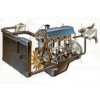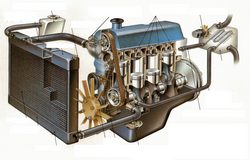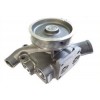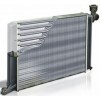Caterpillar cooling system

The Caterpillar cooling system is designed to cool the engine parts that are heated as a result of its operation. On modern technology, the system, in addition to the basic functions, performs a number of other functions, including:
 Heating of air in the system of heating, ventilation and conditioning;
Heating of air in the system of heating, ventilation and conditioning;
Cooling of the oil in the lubrication system;
Exhaust gas cooling in the exhaust gas recirculation system;
Air cooling in the turbo system.
Depending on the cooling method, the following types of cooling systems are distinguished: liquid (closed type), air (open type) and combined. In the liquid cooling system, the heated parts of the engine are drained by a liquid stream. The air cooling system uses airflow. The combined system combines the liquid and air systems.
The Caterpillar engine cooling system includes many elements, including a Caterpillar coolant cooler, an oil cooler, a heat exchanger for the heater, a Caterpillar radiator fan, a centrifugal pump, and a surge tank and thermostat. Control elements are used to regulate the operation of the system.
The Caterpillar radiator is designed to cool the heated coolant with a stream of air. To increase heat dissipation, the radiator has a special tubular device.
Along with the main radiator in the cooling system, an oil cooler and a radiator for the exhaust gas recirculation system can be installed. Caterpillar oil cooler serves to cool the oil in the lubrication system.
Circulation of coolant in the system providing the centrifugal Caterpillar pump. Centrifugal pump Caterpillar can have a different drive: gear, Caterpillar belt and others. On some engines equipped with a turbocharger, an additional coolant circulation pump is connected to the engine control unit to cool the charge air and the turbocharger.
The Caterpillar thermostat is designed to regulate the amount of coolant passing through the radiator, which ensures an optimal temperature regime in the system.
The Caterpillar radiator fan serves to increase the cooling intensity in the radiator.
The Caterpillar temperature sensor captures the measured value and converts it into an electrical signal. To expand the functions of the cooling system at the radiator outlet for additional monitoring of the coolant temperature.
The principle of the cooling system
Depending on the temperature, the liquid circulates through a small or large circle. When the engine is started, the engine and the coolant in it are cold. To accelerate the warm-up of the engine, the coolant moves along a small circle, bypassing the radiator. The thermostat is closed at the same time.
As the coolant is heated, the Caterpillar thermostat opens and the coolant moves through a large circle - through the radiator. The heated liquid passes through the radiator, where it is cooled by a counterflow of air. If necessary, the liquid is cooled by the flow of air from the fan.


